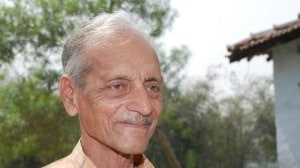Don’t tell this to Jessica Lall’s father
Another grieving father, Chaman Lal Mattoo, whose daughter was murdered — and the accused acquitted — is waiting for six years for hearings to begin in the Delhi High Court.

Another grieving father, Chaman Lal Mattoo, whose daughter was murdered — and the accused acquitted — is waiting for six years for hearings to begin in the Delhi High Court. The reason? The trial court’s papers haven’t been translated and typed. But that’s only one part of this story of how justice is denied when justice is delayed. The Sunday Express investigates
How many days should it take to translate three-year court records from Hindi to English—when the major chunk, the 449-page verdict is already in English? In a case that captured national imagination, a murder of a 22-year-old law student in the nation’s capital? Six months? One year? Two years? Three? Four? Five?
Make it six—and still counting.
That’s how long Chaman Lal Mattoo has been waiting.
His daughter, Priyadarshini Mattoo, was murdered on January 23, 1996. In December 1999, the lower court acquitted the accused, lawyer Santosh Kumar Singh, son of IPS officer J P Singh who retired as Joint Commissioner of Police that year. The CBI went into appeal to the Delhi High Court.
That appeal hasn’t even come up for hearing.
The story of the Mattoo case shows what lies behind Prime Minister Manmohan Singh and Chief Justice of India Justice Y K Sabharwal’s comments last week that the “justice-delivery mechanism” is in a state of “collapse.”
The Sunday Express sifted through trial court and High Court records to piece together the judicial timetable of the case. It shows, in shocking detail, how justice is denied when justice is delayed.
And the reasons behind the delay: from no lights in the courtroom to a judge on leave, from the case being transferred to another judge by mistake to lawyers suspending work to even the tantrums of the accused.
But first, the High Court.
The appeal against the lower court acquittal was drawn up on March 7, 2000. As per the High Court’s official website, that appeal has figured only six times since it was admitted on July 18, 2000.
And on each occasion, it moved not one inch forward:
• March 5, 2002: Preparation of “paperbook” under process, listed for directions on April 9. The “paperbook” is a compilation of all papers from the trial by the High Court Registry—daily orders, witness statements, and the judgment. Papers in local languages—in this case, Hindi—are translated into English and re-typed. Mattoo’s father says that there are merely 300 pages in Hindi.
• April 9: Preparation of paperbook still under process.
• October 23: Registry directed to expedite preparation of paperbook and appeal listed for hearing.
• March 26 and May 21, 2003: Case listed. On both occasions, the paperbook wasn’t ready.
• In two days, it will be three years since then, no word yet on the paperbook.
The Sunday Express contacted former Additional Solicitor General of India Altaf Ahmed who represented CBI in the Mattoo appeal. Asked to explain why despite the October 23, 2002 order nothing has moved, he said: “The CBI did move the court for an early hearing but efforts did not fructify. The High Court Registry, despite clear orders from a Division Bench, failed to implement it timely.”
Asked why, he said: “There is so much congestion of work due to pendency which has snowballed into this kind of inefficiency.”
The Registrar-General, the head of the Registry, was unavailable for comment. A Registry official, speaking on condition of anonymity, said that given the backlog of cases, the fate of the appeal wasn’t “alarming.”
Agreed R K Naseem, counsel of the accused. “Preparation of paperbook is a time-taking procedure. The hearing can’t take off unless it is ready. Cases instituted before 2000 are pending. No special treatment can be given to this case.”
Priyadarshini’s father certainly knows that.
Why the appeal is so important
The case, in brief:
(Tomorrow: No lights in the courtroom, lawyers suspending work, a marriage in the investigating officer’s family, a judge on leave)





- 01
- 02
- 03
- 04
- 05


























